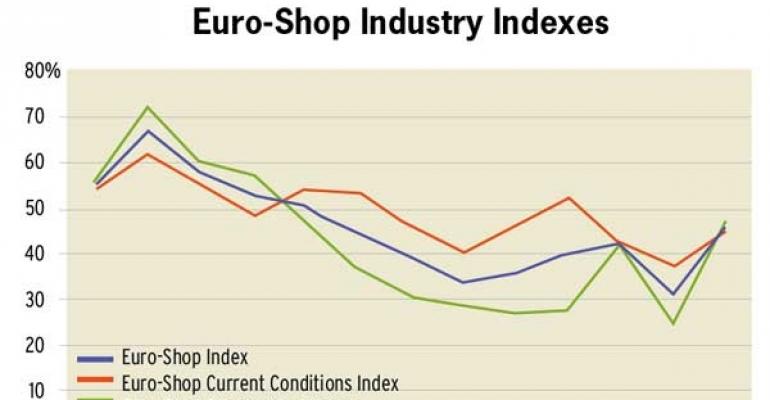After dropping to a new low in February, ICSC’s Euro-Shop Index rebounded in March, reaching its highest level in nearly a year.
ICSC, in conjunction with its European Research Group, tracks sentiment among European shopping center owners in three indexes—one on current conditions, one on expectations and a broader index that blends the other two sentiments. The indexes weigh several factors, including sales performance, shopper traffic, occupancy rates and re-leasing activity.
In March, the Euro-Shop Index, the index that summarizes of current and future business conditions, reached 46 percent—the highest it has been since July 2011. These summary statistics are diffusion indexes that can range from 0 percent to 100 percent. A reading of 50 percent means industry conditions were relatively unchanged from the prior period. A reading below 50 percent means conditions declined, while above 50 percent marks an improvement. That means European shopping center executives in March thought conditions declined, but not as quickly as in some previous months.

The Euro‐Shop Current‐Conditions Index rose to 45 percent in March—up from an all time low of 37 percent in the prior month. Three of the four components to the index rose from February to March, with footfall rising by 25.5 percentage points to achieve growth of 59 percent, bringing it back in line with the level seen a year ago. Both retail sales and rent spreads continued to decline, however.
Occupancy was the weakest component in March and fell for the first time in 12 months—down to 38 percent from 53 percent in February. According to ICSC’s report, “Many retailers are finding trading conditions difficult, particularly as the quarterly rent day looms large. For some this has proven to be the breaking point and anecdotal evidence suggests that the number of retail administrations rose sharply in March. Other retailers are looking to rationalize their bricks and mortar portfolios and focus on the major towns and cities, thus impacting on the secondary locations.”
Looking forward, the expectations index remained below 50 percent for the ninth straight month. But the index rose from 25 percent in February to 47 percent in March.
According to ICSC’s report, “This corresponds with the latest composite leading indicators from the Organisation for Economic Co‐operation and Development (OECD) which suggest that the Eurozone is showing ‘tentative’ signs of economic recovery. Indeed one respondent to the March shopping centre executives survey stated that there are some reasons for slight optimism in the major European markets.”
The survey results were compiled from responses of European shopping‐centre executives collected between March 16 and March 30.
Closer to home
The mood in Europe stands in contrast to sentiment in the U.S., where shopping center executives are more bullish. The ICSC Shopping Center Executive Opinion Survey found that business conditions improved in March, albeit at a slower pace than recent months.
The Shopping Center Executive (SCE) Business Barometer, which is the survey’s overall summary measure, recorded a 56.5 percent reading for March 2012. It’s down from 58.6 percent in February, although that figure represented an eight-year high. In addition, the barometer remained above the crucial 50 percent threshold for the fourth consecutive month, meaning overall sentiment is in positive territory.

Like the European index, the barometer combines sentiments of current conditions and expectations.
The SCE Current Evaluation Index recorded a 55.9 percent reading, while the SCE Expectations Index reached 57.1 percent during March.
The indexes weigh five metrics, all of which remained above 50 percent in March. Occupancy rates led the five categories (57.4 percent), followed by sales (56.5 percent), customer traffic and capitalization rates (55.6 percent), and rent spreads (54.6 percent).
The latest survey information was collected from shopping–center owners and developers between March 7 and 29.

